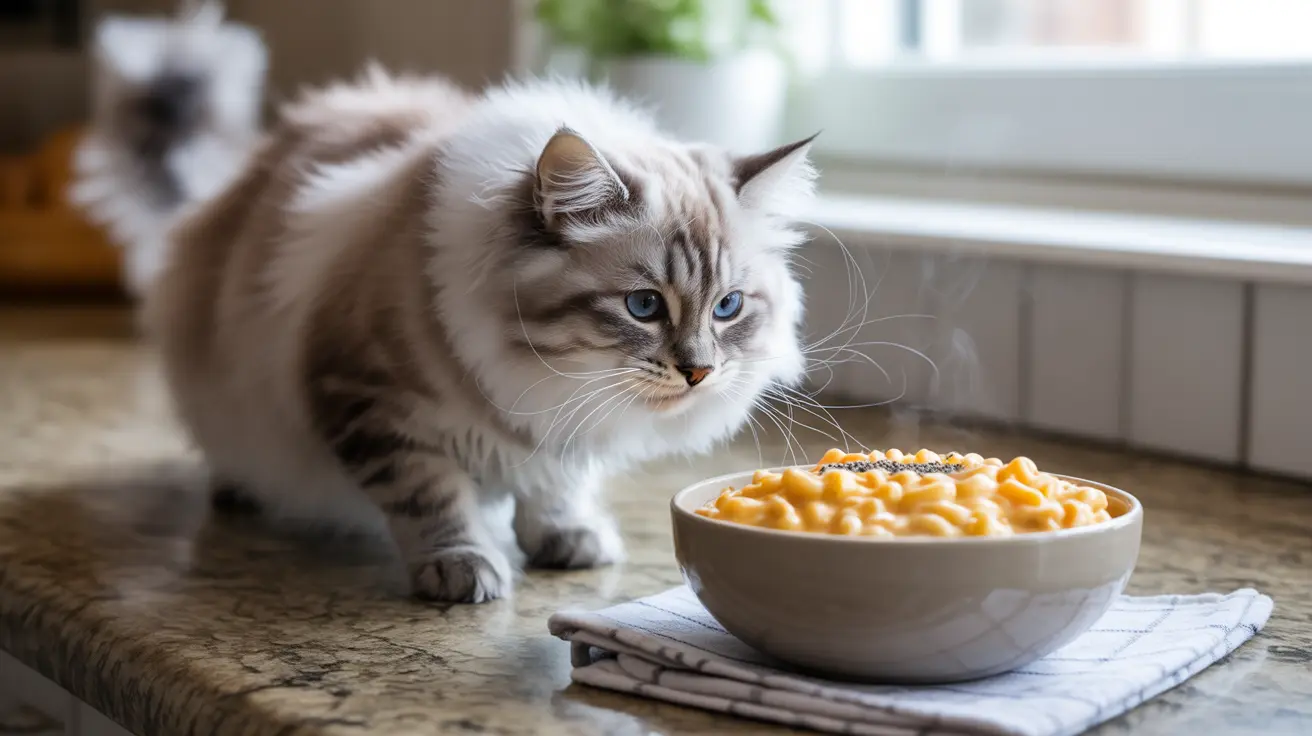If you've ever enjoyed a bowl of mac and cheese, you might have noticed your feline friend showing interest in this comfort food classic. But before sharing this creamy dish with your cat, it's crucial to understand the potential risks and health implications.
While mac and cheese isn't toxic to cats in its basic form, it's far from an ideal treat for your feline companion. Let's explore why this popular dish could pose health risks to your cat and what alternatives you should consider instead.
Why Mac and Cheese Is Problematic for Cats
Cats are obligate carnivores, meaning their bodies are designed to process meat, not dairy products or carbohydrates. Mac and cheese presents several significant challenges to feline health:
Lactose Intolerance Issues
Most adult cats are lactose intolerant, lacking the necessary enzymes to properly digest dairy products. The cheese and milk in mac and cheese can cause severe digestive upset, including:
- Diarrhea
- Vomiting
- Stomach pain
- Gas and bloating
- Dehydration
Hidden Dangers in Ingredients
Many mac and cheese recipes contain ingredients that can be toxic to cats, including:
- Onion powder
- Garlic powder
- Chives
- Excessive salt
- Artificial preservatives
Health Impacts of Mac and Cheese on Cats
Immediate Health Concerns
When cats consume mac and cheese, they may experience immediate symptoms within 8-12 hours, including:
- Gastrointestinal distress
- Increased thirst
- Lethargy
- Loss of appetite
Long-term Health Risks
Regular consumption of mac and cheese can lead to serious health issues:
- Obesity from high fat content
- Diabetes
- Kidney problems from excess sodium
- Chronic digestive issues
What to Do If Your Cat Eats Mac and Cheese
If your cat manages to sneak some mac and cheese, follow these steps:
- Assess the amount eaten
- Check ingredients for toxic components
- Monitor for adverse reactions
- Contact your veterinarian if symptoms appear severe
Safe Alternatives to Mac and Cheese
Instead of mac and cheese, consider these cat-friendly treats:
- Plain, cooked chicken pieces
- Small amounts of lean, unseasoned turkey
- Commercial cat treats formulated for feline health
- Fresh water always available
Frequently Asked Questions
Can cats safely eat mac and cheese, or is it harmful to their health?
No, while not immediately toxic, mac and cheese is harmful to cats due to lactose content, high fat, and potentially dangerous ingredients. It's best to avoid feeding it to cats entirely.
What are the risks if my cat eats mac and cheese containing onions or garlic?
If your cat consumes mac and cheese with onions or garlic, seek immediate veterinary care as these ingredients can cause dangerous anemia in cats, even in small amounts.
How can I tell if my cat is lactose intolerant after eating mac and cheese?
Watch for symptoms like vomiting, diarrhea, gas, and stomach discomfort within 8-12 hours of consumption. Most adult cats are lactose intolerant.
What should I do if my cat eats a large amount of mac and cheese?
Monitor your cat closely for adverse reactions and contact your veterinarian if you notice severe symptoms like persistent vomiting, diarrhea, or lethargy.
Are there any safe human food alternatives to mac and cheese that I can share with my cat?
Yes, you can offer small amounts of plain, cooked meat like chicken or turkey without seasonings, salt, or sauces. Always consult with your vet before introducing new foods.
Remember, the best approach to keeping your cat healthy is to stick to their regular cat food and veterinarian-approved treats. While it might be tempting to share your favorite foods with your pet, their digestive systems and nutritional needs are very different from ours.






